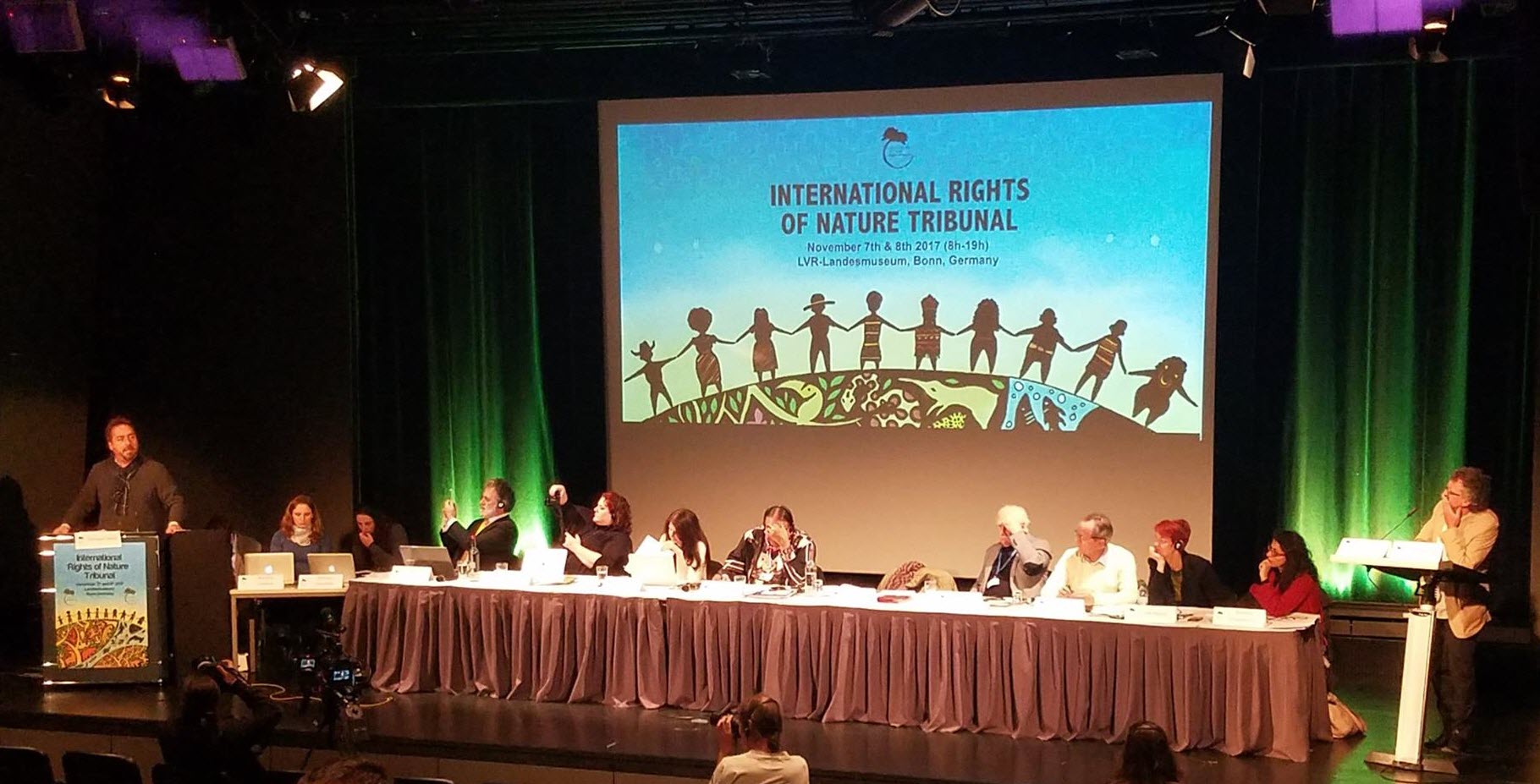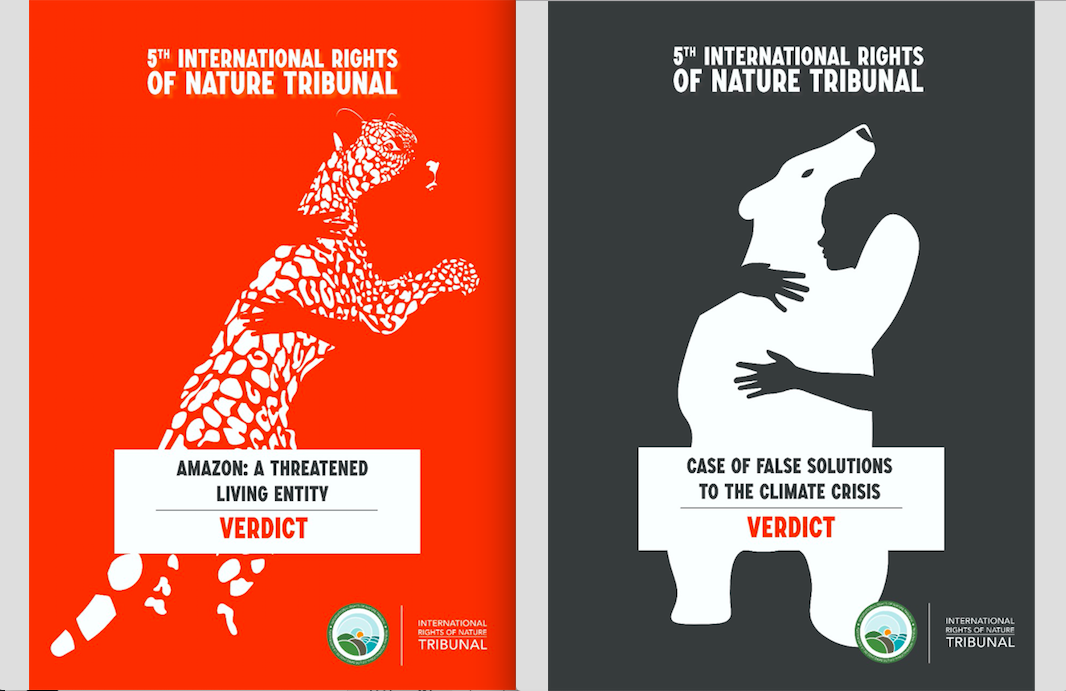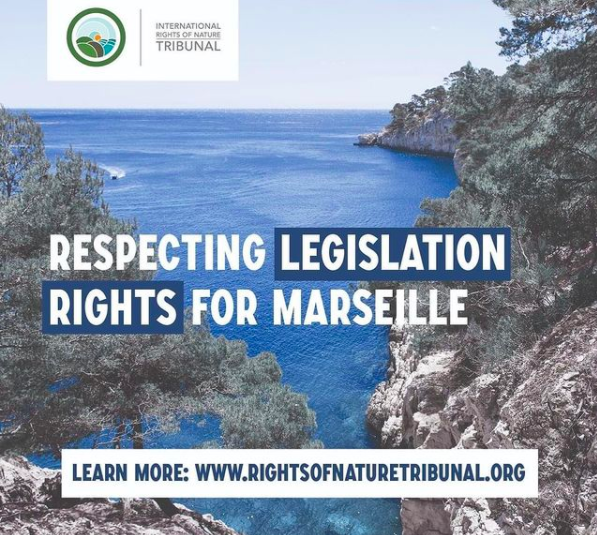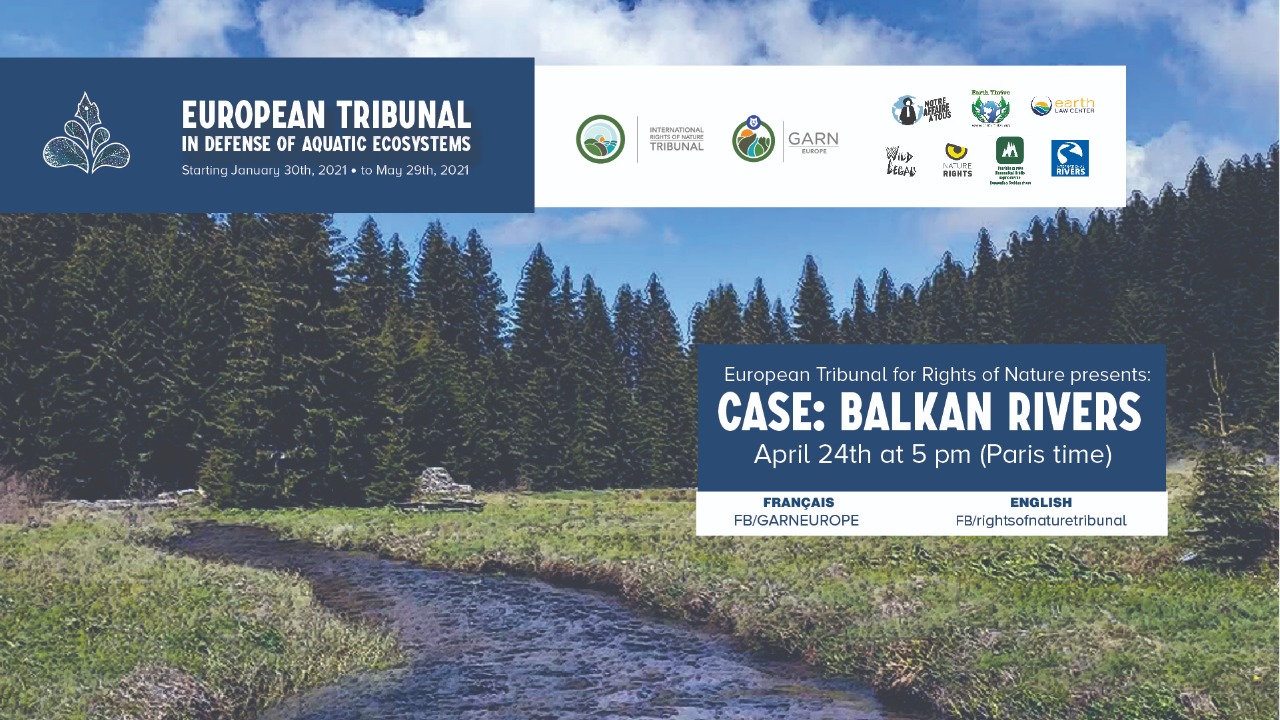The 4th session of the International Rights of Nature Tribunal held concurrently with the 23rd United Nations Framework Convention on Climate Change Conference of Parties (COP23), exposed the significant role that legal systems play in enabling climate change and global environmental degradation. The Tribunal heard seven cases from around the world which collectively demonstrated that global and national climate change commitments cannot be met without fundamental changes to the legal systems which legalize the activities that cause climate change and the destruction of the ecological systems on which life depends. This is a global problem – one of the cases concerned a massive lignite mine approximately 50 km from the COP 23 negotiations.
The Bonn Tribunal consisted of 9 judges from 7 countries and was presided over by the prominent indigenous climate and environmental justice leader, Tom Mato Awanyankapi Goldtooth. Over the course of two days, 53 people from 19 countries speaking over 7 languages presented cases regarding violations of the rights of Nature. A range of experts who testified before the Tribunal explained that whatever is agreed at the COP 23 and subsequent meetings, action to combat climate change will be ineffective while governments continue to authorize coal mines, oil wells, and hydraulic fracturing (“fracking”), and the mining of groundwater, and allow corporations to use investor-state dispute settlement mechanisms in trade agreements to prevent the taking of effective measures to protect life.
Witnesses gave first-hand accounts of what it is like to live near fracking operations, oil wells, refineries, and coal mines, about how those who defend Mother Earth are persecuted, attacked, criminalized, and have their homes burnt. It heard of the anguish of indigenous and other peoples from local communities who live in intimacy with Nature as it is destroyed by roads, mines, or industrial agriculture in order to benefit a small elite.
Indigenous peoples from around the world played a prominent role throughout the Tribunal as experts and witnesses. The Tribunal opened with deeply moving ceremonies and evocations of Mother Earth by representatives of the Sámi people of Europe, the Sarayaku community in the Ecuadorian Amazon, and the indigenous peoples of North America. Indigenous peoples from Africa, Russia, Bolivia, Ecuador, French Guyana, and the USA/Turtle Island presented testimonies that drew the Tribunal’s attention to the sacredness of Earth – a dimension ignored in the COP 23 negotiations.
The Tribunal found that in each of the seven cases, serious and systematic violations of the Universal Declaration of the Rights of Mother Earth (UDRME) had occurred, often accompanied by human rights violations, and in several cases, the harm was so severe as to constitute ecocide. In each case, the legal system did not provide adequate remedies to prevent ongoing harm. In most cases, the harm was caused by activities such as deforestation and mining which could only take place because they had been authorized by law. It was abundantly clear those legal systems that elevate property rights and the rights of corporations above the rights of water, air, and ecosystems to exist and contribute to the ecological health of the planet, are exacerbating climate change by clothing destructive activities in a cloak of legal legitimacy. The Tribunal noted that carbon, biological, conservation offsets, and ecosystem services are financialization processes that enable Nature to be privatized, commodified, and traded in financial market systems. Carbon markets are false solutions that do not cut emissions at the source.
Climate Change and False Energy Solutions.
Expert witnesses testified about how corporations such as Exxon not only profit from activities that they know cause dangerous climate change, they have also deliberately promoted false solutions to climate change (e.g. nuclear energy and gas from fracking operations) and are impeded the introduction of renewable energy and other climate change mitigation measures. In some cases, corporations have spread false propaganda about indigenous peoples and others opposing the fossil fuel industry.
The Tribunal heard disturbing evidence from witnesses about the severe health impacts of living in places polluted by the coal, oil, and gas industries. Evidence was presented about how energy industry operations had contaminated water, air, and ground in many parts of the world in violation of the rights of Mother Earth and of human rights. Witnesses from Mauritius and Texas gave evidence of the impacts of severe hurricanes and cyclones caused or exacerbated by climate change. For example, in the aftermath of Hurricane Harvey, homes were damaged, environmental restrictions were suspended and people had to breathe toxic fumes.
The Tribunal found that gas extraction by means of hydraulic fracturing (“fracking”), nuclear energy, and carbon markets are all false solutions used to delay the transition to low-carbon societies. For example, fracking “breaks the bones of the Earth” and only perpetuates the destructive dependence upon oil, and gas. Carbon trading commodifies nature and allows the wealthy to buy the right to exceed national emission limits. The Tribunal decided that promoting and undertaking these activities violates the rights of Nature, including the right to integral health.
Financialization of Nature and the REDD+
Evidence was presented that REDD+ (Reducing Emissions from Deforestation and Forest Degradation) framework and other carbon market frameworks and payment for ecological services have resulted in more ecological destruction and pollution and facilitated the establishment and continuation of destructive industries. Witnesses explained how systematic mechanisms, such as REDD+ were resulting in indigenous and local peoples who had not degraded their lands being disposed of and losing their rights in order to enable a polluting company elsewhere in the world to continue exceeding air emission limits.
The Tribunal found that those systems such as REDD+ that commodified Nature failed to recognize the reality that human beings are an integral and inseparable part of a living Earth community and that the exploitation, commodification, and financialization of Nature is detrimental to all. Those who established these systems or who traded in carbon or biodiversity “credits”, were violating the rights of Nature and failing in their duty to ensure that the pursuit of human wellbeing contributes to the wellbeing of Mother Earth.
Lignite mining in the Hambach Forest
Witnesses gave evidence of how a massive lignite mine near Bonn has created the largest hole in Europe, and as it expands is destroying whole villages and the ancient Hambach forest. The forest has existed for 12,000 years, contains 800-year-old trees, and is home to 142 protected species. Only about 7 square kilometers of the original 60 square kilometers are left. The Tribunal heard evidence about how burning the lignite from the mine will exacerbate
global warming and cause severe pollution and health risks as well as diminish and pollute the groundwater which sustains the forest and other ecosystems. It also heard evidence from young people who are living high up in the trees in an attempt to protect them from destruction, and of how they now have an intimate relationship with the trees and the forest.
The Tribunal found that further expansion of the mine must be stopped immediately, that the site should be rehabilitated as far as possible and that Germany should recognize the rights of Nature in law in order to prevent such projects in the future. The Tribunal also drew attention to the fact that it is necessary to cease all coal mining as soon as possible in order to mitigate climate change, and particularly its effects on future generations.
Defenders of Mother Earth
The UDRME requires all human beings and institutions to defend the rights of Mother Earth and of all beings. Evidence from around the world exposed the widespread disregard for this duty and how people, particularly indigenous peoples, in the United States of America, Russia, Latin America, and Africa are being persecuted for defending Nature from harm. In many cases, the persecutions of indigenous peoples such as the Sámi peoples over long periods of time were clearly designed to destroy cultural understandings and practices that respect and protect the rights of Mother Earth and other beings.
Witnesses who testified included water protectors from Standing Rock in the United States, and representatives of indigenous peoples from Sweden (Sámi), and Russia (Shor). The Tribunal heard how indigenous people using peaceful means to defend water and Mother Earth are met with violence as governments protect corporate interests as occurred at Standing Rock. The Lakota Sioux tribe was never adequately consulted about the construction of the Dakota Access Pipeline across their land. The evidence showed that the pipeline would diminish the quality of life of indigenous peoples’ minorities, specifically in relation to the sacredness of water and sacred and culturally significant areas.
The Tribunal noted the ongoing history of systemic violations of the rights of the indigenous peoples. And reiterated that everyone has the duty to defend those who protect the rights of Mother Earth and to break the pattern of violation and abuse of indigenous peoples.
Almeria –deprivation of water
In the Almeria waters case, the Tribunal found that the abstractions of huge quantities of water from aquifers in the Almeria region of Spain, primarily to irrigate large-scale intensive olive plantations is a violation of the rights of the rivers and ecological systems of Almeria, and a violation of the human rights of local peoples. The Spanish State and the government of Almeria must act immediately to stop the abstraction of groundwater to enable the ecosystems to recover, and the intensive cultivation of olives in Almeria must cease.
This case illustrates the consequences of treating water as a commodity that can be monopolized by the wealthy instead of recognizing water as a vital source of life, which must be respected and afforded the highest level of protection. Although this case focused on a specific area, it is an example of what is happening in many areas of the world, and the principles are universal. Those human societies that do not respect water as life and which fail to take whatever measures are necessary to protect the ecological systems and cycles that generate water, destroy life and ultimately destroy themselves. Water is priceless – societies that sacrifice water sources for money will pay a terrible price.
Threats to the Amazon
The Tribunal decided to hear a number of cases from different parts of the Amazon simultaneously in order to consider threats to the Amazon ecosystem in a holistic way. It heard evidence of widespread violations of indigenous rights and the rights of Mother Earth throughout the greater Amazon region. This included testimony about the huge mine proposed in French Guyana, and from communities in Brazil, Bolivia, and Ecuador. It is clear that this vital ecosystem that is a reservoir of life, home to many peoples and an essential part of maintaining global climatic stability, is being subjected to many attacks which violate its right to exist and maintain its vital cycles. The extractivist global model inevitably results in violations of the rights of the Amazon as a whole and diminishes the quality of life of all organisms in the region.
The Tribunal heard allegations of violations of the rights of Mother Earth arising from the proposed construction of a major road through the TIPNIS protected area in Bolivia and from oil exploitation in the area. Evidence about the victimization and intimidation of those opposing the construction of the road was also placed before the Tribunal. The Tribunal noted this evidence with great concern, particularly because the Universal Declaration of the Rights of Mother Earth was proclaimed in Bolivia in 2010 and Bolivia has championed rights of Nature internationally.
The Tribunal decided that it wished to gather more evidence from all concerned, including the State of Bolivia, and if possible to send a delegation on a fact-finding mission to Bolivia. It also decided to request the Bolivian government to impose a moratorium on construction of the proposed road and bridges through TIPNIS and on further oil exploration in or near TIPNIS, until the Tribunal has completed its work. The Tribunal was of the view that the imposition of such a moratorium would be an appropriate precautionary measure to avoid possible violations of rights of Mother Earth while a resolution to this dispute is being sought.
Trade Agreements and their Implications on Nature
Expert witnesses from Canada, Germany, South Africa, and Puerto Rico testified that Free Trade Agreements (FTAs) are the drivers of an unsustainable economy based on fossil fuels, privatization, commodification, and legalized enslavement of all life on Earth. FTAs are legally binding and take precedence over non-binding commitments made under the Paris Agreement. States can even be prevented from passing new laws to protect ecosystems if the tribunals established under Investor-State Dispute Settlement Mechanisms (ISDSMs) in FTAs decide that they are “barriers to trade”. Indigenous peoples pay the highest price under schemes like NAFTA. Because they have protected and live close to the land, they are targets for displacement in the quest for pristine untapped “resources” for drilling, clear-cutting water mining, etc. For example, 50% of the groundwater has already been depleted in NAFTA-affected areas in Mexico.
The Tribunal found that Free Trade Agreements result in systemic violations of the Rights of Nature and are based on the delusion that trade is more important than life. The provisions of these agreements must be regarded as null and void to the extent that they conflict with the rights and duties in the UDRME.
Notes
The Global Alliance for Rights of Nature (GARN) is a network of organizations and individuals committed to the universal adoption and implementation of legal systems that recognize, respect, and enforce “Rights of Nature. The Universal Declaration of the Rights of Nature is available here.





